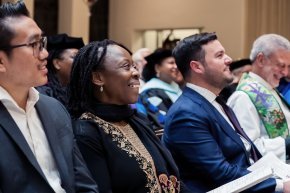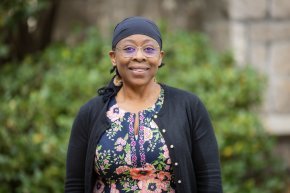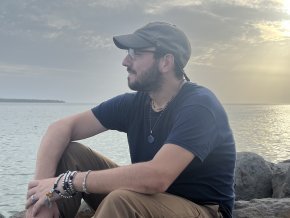
The bridge between medicine and theology

Seminary student Lillian Okoronkwo, M.Div. ’25, has travelled much of the world and lived in many countries.
“I spent the first 19 years of my life in the Middle East, mostly in Israel, but also lived in Egypt and Syria. My secondary school was in the United Kingdom, undergraduate studies (pre-med) in Boston and Miami, then medical school in the West Indies and completed my medical education in Nigeria,” shared Okoronkwo.
After completing a year of National Youth Service Corps (NYSC) and working at a hospital in Nigeria, she followed in her father’s footsteps and joined the United Nations — traveling for work in post-conflict societies before reaching a point where she decided to pursue a long-held interest in public health.
“Medicine is one on one — which I love — it will always be my passion. But I want to have a wider platform to reach more people about health,” said Okoronkwo, whose travels then brought her to the University of South Carolina to complete a Master of Public Health (MPH). “However, once I finished my master’s degree, a lot of the positions that I was seeing were research orientated, and I am a more grassroots, in-the-field type of person — I wanted to work towards health education, health promotion and changing of behaviors.”
This led her to join Eau Claire Cooperative Health Center in Columbia, South Carolina, as the chief clinical operations officer. In this role, she led and directed clinical operations for about 25 sites that delivered health services to underserved communities across four counties in the state. Despite finding it rewarding, Okoronkwo was ready for the next step in her career and felt a call to do more.
“I was engaged in the welfare of my teams. I supported my core team and together we were oversight for all the clinicians (physicians, physician assistants, nurse practitioners) and support staff (medical assistants, receptionists, etc.). But I think deep in my heart, I wanted a way to mix ministry with medicine,” she shared. “The landscape overseas is very different when it comes to medicine, particularly in Africa. What I enjoyed there is, while consulting patients, you are free to talk about how you can help them with the spiritual side of things — whereas I find here in the U.S. it seems to be more restrictive how we talk about God and spiritual aspects of people's lives.”

In an effort to combine medicine and ministry, she completed chaplaincy training in Charleston, South Carolina, and worked as a chaplain resident for Roper-St. Francis Hospital.
“That was a very satisfying moment for me, and I felt this is really what has been in my heart, being able to talk to patients about their spiritual lives. It was so rewarding just to talk with them, whether before a surgery or after they received bad news. It is an amazing experience to spend time with people and know that they are part of my journey and reconnecting me with medicine — as I walk alongside them on their own journeys to spiritual health and bodily well-being.”
Drawn to a career in healthcare chaplaincy, Okoronkwo is working on her Master of Divinity at LTSS. As she advances through the program, she has adapted a tagline of sorts.
“One of my main sayings is we need to make the healthful choice become the default choice for all people. And when we talk about health, it means holistic health — this includes every human being, every system and government — and we need to make sure that as people go through their daily lives, they choose the helpful and healthful options of anything they're trying to choose between as the default selection. Barriers need to be eliminated that keep them from being able to accomplish this goal. An example of this is diet. We keep telling people to eat the right foods, but it's so much more expensive to eat organic foods, so the accessibility of eating better is taken away for many. We ask people to walk more, but then we don’t have sidewalks or safe areas for them to walk outside. I really want us to think about making healthy choices an intentional and willful action,” said Okoronkwo.
When it comes to spiritual health, she believes that you cannot live life without attending to your spiritual needs because spiritual health affects the whole self.
“I believe each human being has a spiritual need which must be satisfied in order for one to be well. If you have a strong, healthy physical body and your mind is alert, but your spiritual needs are unmet, I believe you will struggle through life because your whole being is not well. We are spirit beings created by God, therefore we must align all the parts of us, our physical bodies, our minds, our hearts, our spirituality.”
While completing chaplaincy training in Charleston, Okoronkwo saw physical health and spiritual health needs intersect on a daily basis, which solidified her approach.
“Some patients were of Christian faith but did not want to pray in that moment — either they were hurting badly or had some other reason. So, we didn't pray — we talked and sat together. Others who were not Christian would say, ‘Can you just pray?’ And I'd ask, ‘Well, since you're not Christian, how would you like me to pray?’ They would ask me to pray any way I liked,” she shared. “We can't assume what people need unless we talk to them. It is only then we can help them meet these spiritual needs. Once these conversations happen, people oftentimes start feeling better, brighter and more encouraged. Even though you haven't done anything for them physically, such as giving medication, people sometimes just need to be in the right place spiritually before they can really understand why they should keep taking their medicines. It will not solve all the problems the patient is facing but can be a large contributing factor to overall health.”
After travelling to many places in her life, Okoronkwo does not know her next stop after she graduates from LTSS.
“I am waiting on God to lead me to a location, but taking care of people’s spiritual needs in community environments — that is where my heart lies, and I will follow it.”

Susan McArver, Ph.D., took a deep dive into the role of the church behind the history of colonization and domination over Indigenous peoples in the Americas during her fall Explore Course, “The Land and its Inhabitants.”
View More
In November 2022, a routine email check put Josh Kenst, MTS ’23, on a path that led him to a year long global mission program in Senegal.
View More